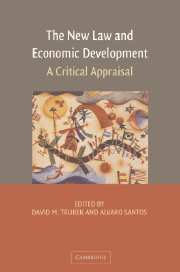Book contents
- Frontmatter
- Contents
- Contributors
- 1 Introduction: The Third Moment in Law and Development Theory and the Emergence of a New Critical Practice
- 2 Three Globalizations of Law and Legal Thought: 1850–2000
- 3 The “Rule of Law” in Development Assistance: Past, Present, and Future
- 4 The “Rule of Law,” Political Choices, and Development Common Sense
- 5 The Dialectics of Law and Development
- 6 The Future of Law and Development: Second-Generation Reforms and the Incorporation of the Social
- 7 The World Bank's Uses of the “Rule of Law” Promise in Economic Development
- Index
4 - The “Rule of Law,” Political Choices, and Development Common Sense
Published online by Cambridge University Press: 06 July 2010
- Frontmatter
- Contents
- Contributors
- 1 Introduction: The Third Moment in Law and Development Theory and the Emergence of a New Critical Practice
- 2 Three Globalizations of Law and Legal Thought: 1850–2000
- 3 The “Rule of Law” in Development Assistance: Past, Present, and Future
- 4 The “Rule of Law,” Political Choices, and Development Common Sense
- 5 The Dialectics of Law and Development
- 6 The Future of Law and Development: Second-Generation Reforms and the Incorporation of the Social
- 7 The World Bank's Uses of the “Rule of Law” Promise in Economic Development
- Index
Summary
Although we easily intuit that development policy making is saturated with political significance, political choices are often presented in vocabularies of economic and legal expertise that obscure the political stakes of development policy making. This chapter retells the postwar history of economic and legal expertise in the development field to highlight the possibility – and also the difficulty – of reclaiming its political significance.
I use the term political in two senses. Experts act politically when they distribute resources among groups and individuals – we can decode the politics of this work by associating expert choices with the interests of groups that contest one another's claims on resources in the arenas we think of as political: men and women, rich and poor, rural and urban, North and South, agricultural and industrial. Experts also act politically when they affect the distribution of power among ideological positions that we associate with political contestation: left, center, and right.
I tell the history of development common sense in four phases: a postwar modest interventionist consensus (1945–1970); followed by a period of crisis and retrenchment (1970–1980); a new consensus on transition from socialism, first in the third world, and then in the second (1980–1995); followed by a period of doubt, reexamination, and eclecticism (1995-the present) during which the neoliberal “Washington Consensus” has been chastened in numerous ways.
- Type
- Chapter
- Information
- The New Law and Economic DevelopmentA Critical Appraisal, pp. 95 - 173Publisher: Cambridge University PressPrint publication year: 2006
- 47
- Cited by



